Reppy Institute for Peace and Conflict Studies
Gender and the Security Sector Seminar Series: Kelly Hunter
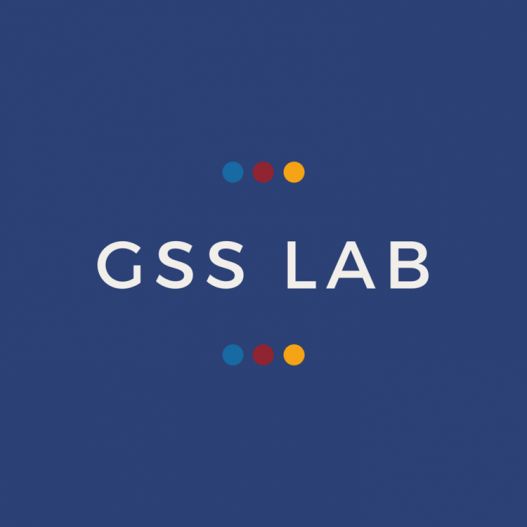
May 3, 2021
12:00 pm
Kelly Hunter presents a paper titled "Who intervenes and how? The politics of intervention for conflict-related sexual violence"/.
Additional Information
Program
Reppy Institute for Peace and Conflict Studies
Authoritarianism and Democratic Backsliding in Southeast Asia: A Virtual Roundtable
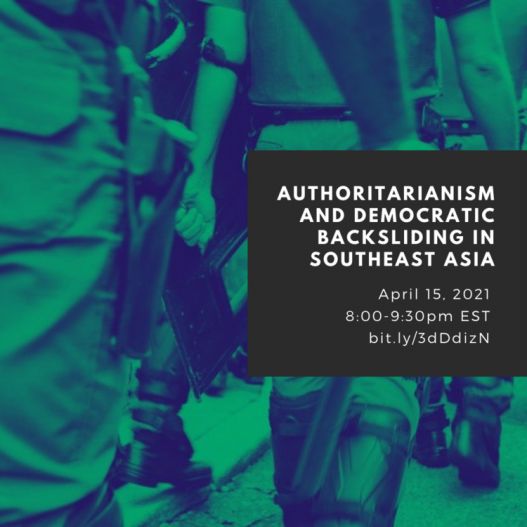
April 16, 2021
8:00 pm
The global trend of democratic backsliding has reshaped politics around the world, from the United States to Indonesia. Throughout Southeast Asia, a region long marked by contestation between authoritarian and democratic politics, contemporary authoritarian practices interact with local histories to generate distinctly new forms of politics—from penal populism in the Philippines to Burma’s most recent military coup. This virtual roundtable on authoritarianism brings together four experts on the politics of Myanmar, Indonesia, Thailand, and the Philippines to understand contemporary authoritarianism and democratic backsliding in the Southeast Asian context.
Introduction: Rebecca Slayton, Director of the Judith Reppy Institute for Peace and Conflict Studies (Associate Professor, Dept of Science and Technology Studies, Cornell)
Moderator: Tom Pepinsky (Tisch University Professor, Dept of Government, Cornell)
Panelists:
Pavin Chachavalpongpun (Associate Professor, Center for Southeast Asian Studies, Kyoto University)Mark R. Thompson (Professor of Politics and Head, Department of Asian & International Studies; Director of Southeast Asia Research Centre, City University of Hong Kong)Ardeth Thawnghmung (Chair of Political Science, Professor, Interim Director, Peace and Conflict Studies, University of Massachusetts Lowell)Eve Warburton (Postdoctoral Fellow, Asia Research Institute, National University of Singapore)
Co-organized by the Southeast Asia Program and the Judith Reppy Institute for Peace and Conflict Studies
Additional Information
Program
Einaudi Center for International Studies
Reppy Institute for Peace and Conflict Studies
Southeast Asia Program
Conversation on the impact of Chinese racism
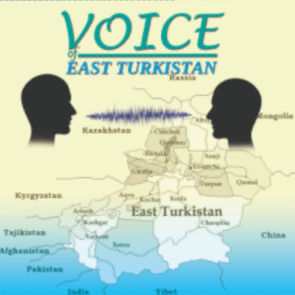
Magnus Fiskesjö, PACS
On the "Voice of East Turkistan" podcast, Fiskesjö discusses how China’s imperial legacy underpins state racism and violence in Xinjiang.
Additional Information
Tech Policy Lab launches with focus on AI
Sarah Kreps, PACS
Research areas are broad and interdisciplinary, and include misinformation and the potential uses and misuses of AI in political communication.
Additional Information
Image, Stories, and Silences of North Korean “Ex-Returnees” Soni Kum artist talk
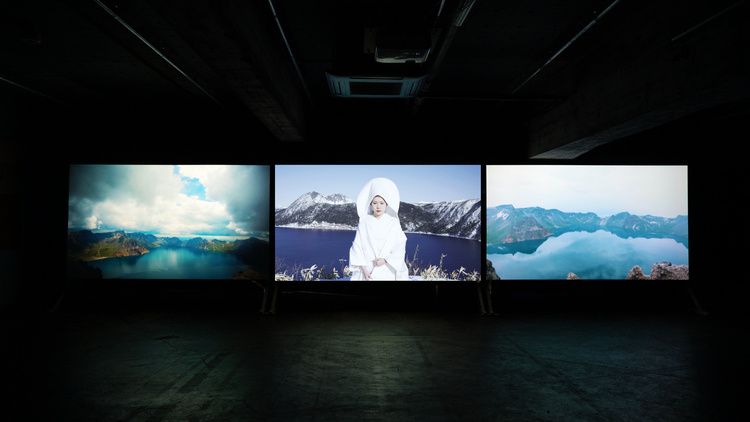
April 2, 2021
10:00 am
Image, Stories, and Silences of “Ex-Returnees” Who Defected from North Korea to Japan: Artist Talk with Soni Kum
Kum will discuss her installation work, Morning Dew-The Stigma of Being "Brainwashed" exhibited in Tokyo in November 2020. It is based on interviews conducted with North Korean ex-“returnees” now living in Tokyo. Most are zainichi Koreans (“ethnic Koreans resident in Japan”) or their children, who from 1959 to 1984 moved to North Korea as part of the Repatriation Program. They thought the DPRK was ‘a paradise on earth,’ only to experience the severe living conditions of North Korea’s recovery from the Korean War. They are compelled to hide the fact that they left, or fled from, North Korea, or experience discrimination and other troubling consequences. Facing these fears of her interviewees, Kum’s work weaves together archival images, text, and silences to artistically evoke their hidden stories.
Discussants include Brett de Bary, Professor Emerita, Cornell, and Rebecca Jennison, Art Critic, Kyoto, Japan.
This event is co-sponsored by the Central New York Humanities Corridor from an award by the Andrew W. Mellon Foundation. This event is also co-sponsored by the Migrations initiative and the Reppy Institute for Peace and Conflict Studies (PACS).
The event image is from the installation named, 'Morning Dew-the stigma of being brainwashed'. To learn more about artist Soni Kum, please visit her website: http://www.sonikum.com/
Additional Information
Program
Einaudi Center for International Studies
East Asia Program
Reppy Institute for Peace and Conflict Studies
Set the World on Fire: Black Nationalist Women and the Struggle for Global Freedom
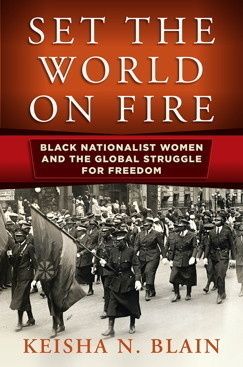
March 25, 2021
11:25 am
Keisha Blain leads a discussion of excerpts from her book "Set the World on Fire: Black Nationalist Women and the Struggle for Global Freedom" published by University of Pennsylvania Press, 2018.
Note: The author will join for a conversation about their work. No formal presentation will be given; please read in advance. A link to the reading will be sent with the registration confirmation.
Part of the Reppy Institute for Peace and Conflict Studies (PACS) seminar series.
About the author
Keisha N. Blain is an award-winning historian of the 20th century United States with broad interests and specializations in African American History, the modern African Diaspora, and Women’s and Gender Studies. She is an Associate Professor of History at the University of Pittsburgh and the president of the African American Intellectual History Society. She is currently a 2020-2021 fellow at the Carr Center for Human Rights Policy at Harvard University. She also serves as an editor for the Washington Post’s ‘Made by History’ section.
Blain has published extensively on race, gender, and politics in both national and global perspectives. She is the author of the multi-prize-winning book Set the World on Fire: Black Nationalist Women and the Global Struggle for Freedom (2018) and co-editor of three books: To Turn the Whole World Over: Black Women and Internationalism (University of Illinois Press, 2019); New Perspectives on the Black Intellectual Tradition (Northwestern University Press, 2018); and Charleston Syllabus: Readings on Race, Racism, and Racial Violence (University of Georgia Press, 2016).
Her latest books are Four Hundred Souls: A Community History of African America, 1619-2019, edited with Ibram X. Kendi (Penguin Random House/One World, February 2, 2021); and Until I Am Free: Fannie Lou Hamer's Enduring Message to America (Beacon Press, October 5, 2021).
Follow her on Twitter @KeishaBlain and on Instagram @KeishaNBlain.
Additional Information
Program
Einaudi Center for International Studies
Reppy Institute for Peace and Conflict Studies
Censored: Distraction and Diversion Inside China's Great Firewall
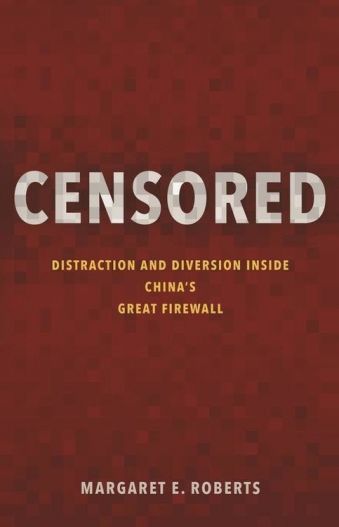
March 18, 2021
11:25 am
Margaret E. Roberts, Associate Professor of Political Science at University of California at San Diego, discusses her book Censored: Distraction and Diversion Inside China's Great Firewall (Princeton University Press, 2018).
The author will join for a conversation about their work. No formal presentation will be given; please read in advance. A link to the reading will be sent with the registration confirmation.
Part of the Reppy Institute for Peace and Conflict Studies (PACS) seminar series.
About the author
Margaret E. Roberts is an Associate Professor of Political Science at University of California at San Diego. Her research interests lie in the intersection of political methodology and the politics of information, with a specific focus on methods of automated content analysis and the politics of censorship in China. She received a PhD from Harvard in Government (2014), MS in Statistics from Stanford (2009) and BA in International Relations and Economics (2009). Currently, she is working on a variety of projects that span censorship, propaganda, topic models, and other methods of text analysis. Her work has appeared or is forthcoming in the American Journal of Political Science, American Political Science Review, Political Analysis, and Science.
Additional Information
Program
Einaudi Center for International Studies
Reppy Institute for Peace and Conflict Studies
East Asia Program
US-China tensions: Joe Biden Signals Tougher Line on Beijing with Key Appointments

Sarah Kreps, PACS
“All of the signs coming out of the administration are that even if many of the individuals are the same as a decade ago, the policies will not be,” says Sarah Kreps, professor of government and adjunct professor of law.
Additional Information
New book Thanks for Everything, Now Get Out

Joseph Margulies, PACS
Prof. Joseph Margulies and Prof. Jamila Michener will discuss Margulies’ new book based on a long-term study of Olneyville, a low-income Latino neighborhood in Providence, Rhode Island, asking whether distressed neighborhoods can be transformed but not destroyed. The question is whether the things we do to fix a neighborhood also make it irresistible to gentrification and displacement.
The conversation will be held on February 24 at 5 pm ET.
Register and join in: https://cornell.zoom.us/webinar/register/WN_iOIkA03KQWiSGyFgdjgvcg
Additional Information
Gender and Security Sector Lab Seminar Series: Rose McDermott
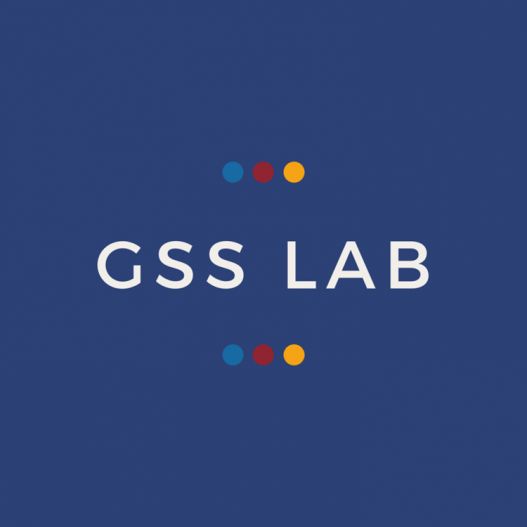
March 1, 2021
12:00 pm
Rose McDermott presents prelimary findings from her work titled "Cross-cultural differences in gendered expectations of care taking?".
Additional Information
Program
Reppy Institute for Peace and Conflict Studies
